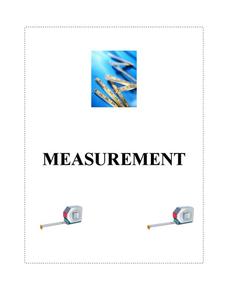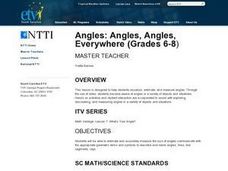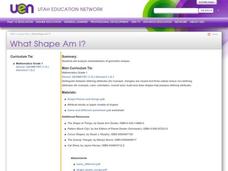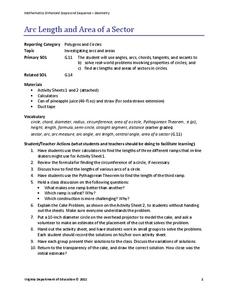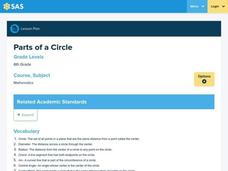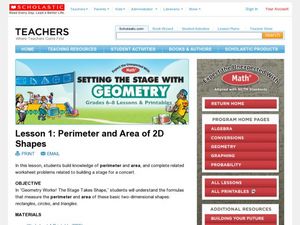Curated OER
Measurement
Students identify and categorize different problem situations or contexts using one of four measurements to solve the problem. Through guided and independent practice, they discover ways to determine which measurement to use when...
Curated OER
What Shape am I?
Learners analyze characteristics of geometric shapes. They find shapes in their environment, and communicate why it is like the shape of their choice and not like another shape.
Curated OER
Angles: Angles, Angles, Everywhere
Students practice estiminating and measuring angles. After watching a short video, they identify angles in objects in the classroom and their homes. In groups, they participate in activities in which they are given a scenerio and are...
Curated OER
Introductory Lesson- Patterns
First graders explore patterns in mathematical context. For this patterns lesson, 1st graders inspect patterns shown to them, copy patterns, complete patterns and create patterns of their own. These patterns are shown by actions,...
Curated OER
Discovering the Magical Pi
Students calculate pi using data on the circumference and diameter of various objects. They define key vocabulary terms, measure the circumference and diameter of various circular objects, organize the data on a table or chart, and...
Curated OER
What Shape Am I?
First graders analyze characteristics of geometric shapes. They identify, describe, and create simple geometric figures. They analyze characteristics of geometric shapes and determine the defining attributes of a circle,...
Curated OER
A Rectangle in the Coordinate Plane
A quadrilateral is drawn on the coordinate plane, and eighth grade geometers find the length of each side and the diagonals by applying the Pythagorean theorem.
Texas Instruments
Properties of Parabolas
Explore the properties of parabolas in this lesson. Construct a parabola given a focus and a directrix on the Ti-Nspire. Write equations of parabolas in vertex form and determine the a value of a parabola given a focus and directrix.
Virginia Department of Education
Arc Length and Area of a Sector
What do skateboarding and baked goods have in common with math? You can use them to connect half-pipe ramps and cakes to arcs and sectors. Pupils compare the lengths of three different ramp options of a skate park. They calculate the...
Curated OER
2-D Geometry
Third graders describe and compare attributes of two-dimensional shapes. They explain geometric terms, angles and shapes. Students demonstrate each vocabulary word with their body and they mirror the body positions associated with each...
Curated OER
Parts of a Circle
Sixth graders use yarn, paper plate, and other materials to identify parts of a circle. In this parts of a circle lesson plan, 6th graders identify the circumference, radius, diameter, and other parts of a circle.
Curated OER
Finding Perimeter and Area
Third graders understand the perimeter by units and now find perimeter by addition. In this perimeter lesson plan, 3rd graders relate their prior knowledge to adding the sides of the perimeter by answering a series of questions.
Curated OER
Circumference, Diameter, Radius
Sixth graders will determine the circumference, diameter, and radius of a circle. In this circle lesson plan, 6th graders will measure the appropriate amount to find these measurements on circles.
Curated OER
Pythagorean Theorem
Students investigate the Pythagorean Theorem. In this seventh through twelfth grade geometery lesson plan, students explore the Pythagorean Theorem and its converse and use it to find the length of the missing side of a right triangle.
Curated OER
Angles, Triangles, Quadrilaterals, Circles and Related
Learners classify angles. In this angles lesson, students explore the characteristics of angles, triangles, quadrilaterals and circles. They identify polygons and sing a classifying angles song. Learners participate in a manipulative...
Curated OER
Exploring Centers of a Triangle: Part 2
Students model and solve a real-world problem by constructing the centroid of a triangle. They explore relationships of the medians of a triangle and investigate how the centroid partitions each of the medians. Students investigate...
Curated OER
Wheeling Around
Eighth graders explore the characteristics of a circle and the formulas to find circumference. They use a bicycle wheel to determine the circumference around a wheel. They utilize a worksheet imbedded in this plan which has a variety of...
Curated OER
Perimeter and Area of 2D Shapes
Students find the perimeter and area of circles, triangles, and rectangles. In this perimeter and area lesson, the teacher gives students formulas for each shape and measurement and works through examples on the board. While no creative...
Curated OER
Pi as a Ratio
Eighth graders measure the circumference and the diameter of circular objects and record the measured values of the circumference and the diameter in a table. They then record their measurements in centimeters and use their data to...
Curated OER
Vocabulary Review and Map Skills
Students, when given the name of a community, identify a food, a craft, a custom, language and music, unique to that community 100% of the time. They find similarities and differences between this community and their own in four...
Curated OER
SAS Similarity Theorem
Learners identify and use the similarity theorem. In this geometry lesson, students differentiate between congruent and similar triangles. They solve problems using the computer modifying shapes by dragging.
Curated OER
Globe Skills Lesson 7 The Transcontinental Railroad
Students explore the Transcontinental Railroad. In this geography skills lesson, students use map skills in order to locate legs of the Transcontinental Railroad on globes.
Curated OER
Globe Skills Lesson 3 Voyage to the New World
Students explore the globe. In this globe skills lesson, students use their knowledge of latitude and longitude to respond to questions regarding Christopher Columbus's maiden voyage to the Americas.
Curated OER
Slope Right Up
Students use triangles to find the length and slope of each side. After connecting the vertices, they add points based on their specific instructions. They use the Pythagorean Theorem to complete a worksheet to end the lesson.


